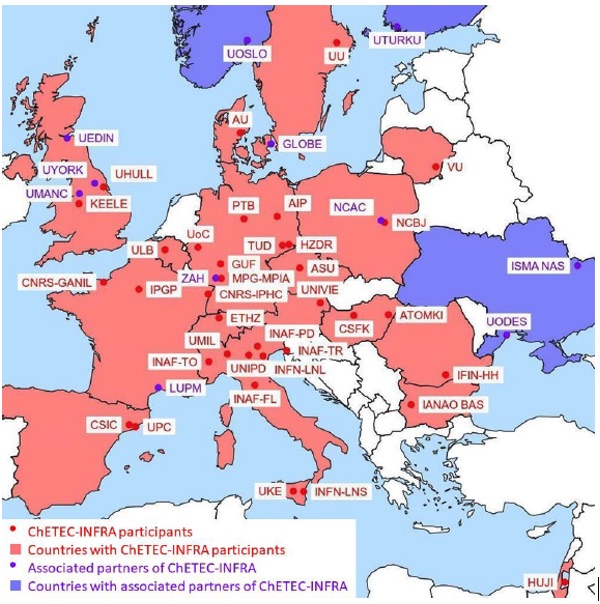ChETEC-INFRA: research infrastructures for Nuclear Astrophysics
A new European H2020 project where INFN takes on a central role
ChETEC-INFRA (Chemical Elements as Tracers of the Evolution of the Cosmos - Infrastructure) is a project recently funded by the EU with a four-year budget of 5 million euros, within Horizon 2020. INFN and other Italian universities hold a central role in the initiative that is located at the frontier of nuclear astrophysics that studies the origin of chemical elements: from the Big Bang, to stellar combustion up to neutron and proton capture processes for the formation of heavier elements.
ChETEC-INFRA constitutes a network between three types of infrastructures which, together, will provide the necessary tools for this research: the astro-nuclear laboratories that provide cross section data of nuclear reactions, the supercomputers that perform calculations of stellar structure and nucleosynthesis, and telescopes and mass spectrometers that collect data on the abundance of elements and isotopes.
ChETEC-INFRA will overcome existing barriers to the advancement of these studies: in particular, access to nuclear astrophysics research infrastructures will be unified using a new integrated web portal; targets and detectors for nuclear reactions, software tools for open-source nucleosynthesis and new three-dimensional models for the analysis of stellar spectra will be developed.
ChETEC-INFRA will provide the community with the tools needed to address key issues on solar fusion, nucleosynthesis by neutron capture and explosive stellar processes. In a combined approach designed to facilitate and increase accessibility, synergies and training, the large amount of transnational access provided will make it possible projects that exploit at least two different types of infrastructure.
Within ChETEC-INFRA, the data will be archived and cataloged for long-term sustainability beyond the end of the project and for their usability in open access.
ChETEC-INFRA involves 32 institutions from 18 European nations and is networked with nuclear astrophysics communities in the United States, China and Japan.
INFN contribution to the project, through its own structures and employees and associates, is broad and widespread.
In particular, INFN will be responsible for the development, construction and testing of both solid and gaseous innovative targets, which will allow the study of nuclear reactions of astrophysical interest at very low energies. Furthermore, it will deal with the development of innovative neutron detectors, such as composite scintillators and new plastic materials, for gamma/neutron discrimination, keeping in touch with industrial partners.
INFN will coordinate the validation activities of the cross sections of the most important reactions for nuclear astrophysics such as those involving 12C and 22Ne, possibly measuring the same reactions with complementary methods, and more generally it will establish and maintain an open-access database of cross sections for a large number of reactions of astrophysical interest.
Finally, INFN will play an important role both in the dissemination of research results with particular reference to funding institutions and industries, and in the training of the next generations of researchers in the field of nuclear astrophysics, through schools and masterclasses.
